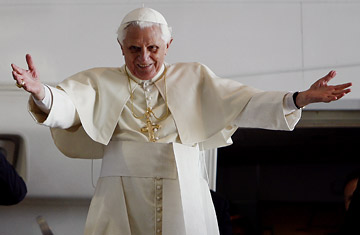
Pope Benedict XVI waves as he departs Australia at Sydney Airport on July 21, 2008.
For many liberal Catholics, July 25, 1968, was the day the music died. Pope Paul VI's encyclical Humanae Vitae, published 40 years ago today, reaffirmed Catholicism's absolute ban on birth control. Coming on the heels of the Second Vatican Council's unprecedented opening of the Church to modernity three years earlier, the Vatican's decision to stand by a doctrine that ever fewer Catholics were obeying would reverberate far beyond the bedroom.
Progressives saw the encyclical as the ultimate proof that the Church was bound to remain out of touch with contemporary reality. Traditionalists, instead, can mark it as the beginning of their return to favor, when the Vatican undertook to stand firm against the forces of secularism blowing through the West — and within the Church itself. Today, the traditionalists clearly have a Pope after their own hearts in Benedict XVI. But he's not one to take their positions for granted.
Though the tide in Rome was shifting back toward the doctrinal firmness he would come to embody, 1968 was a complicated year for Joseph Ratzinger, the current pope. According to his biographers, the then theology professor recoiled from the maelstrom of student protest and provocative behavior on the campus of Tübingen University, where he was teaching. Indeed, the following year he would move to the more conservative (and quiet) campus of the University of Regensberg.
To the surprise of some, however, this was also the year that Ratzinger began a long-running intellectual engagement with the atheist and secular forces he saw rising in the West. In his 1968 theological masterpiece, Introduction to Christianity, Ratzinger used a pithy exploration of the Christian creed to make a sincere effort to understand and even reach out to atheists. "No one can lay God and his Kingdom on the table before another man: even the believer cannot do it for himself. But however strongly unbelief may feel itself thereby justified, it cannot forget the eerie feeling induced by the words: 'Yet perhaps it is true,'" Ratzinger wrote. "In other words, both the believer and the unbeliever share, each in his own way, doubt and belief."
As the Vatican's chief of orthodoxy, Ratzinger continued to engage the secular world. Inducted in 1992 into the prestigious French Academy, the epicenter of Enlightenment thought in Europe, Ratzinger gave a discourse about the challenges of democracy and relativism in the modern world. In 2004, he took part in a sort of Ali-Frazier showdown of European intellectual heavyweights when he publicly debated fellow German Jürgen Habermas, considered by some the preeminent leftist philosopher of his generation.
Since becoming Pope, Benedict has stepped up his so-called "dialogue" with the secular-scientific world. Three months into his papacy he suggested a way to find moral common ground with non-believers, suggesting atheists behave "as if God existed." Benedict even praised Karl Marx in his last encyclical for his "incisive language and intellect ... precision and great analytic skill," before dissecting the errors of his ideology. Next year, the Vatican has slated special conferences to confront the ideas of Galileo and Darwin.
For all that, there is no doubt that Benedict's critique of the West's spreading secularism is as sharp as ever. Just before his election, he provocatively warned against "the dictatorship of relativism," a let-it-all-slide mentality, particularly in the West, that he sees as promoting a lifestyle of loose morals. Yet the Pope seems to understand that hiding from or denying that trend is a losing strategy.
Catholicism's point man on this shifting terrain is Monsignor Gianfranco Ravasi, 65, an erudite and affable Milanese bible scholar, whom Benedict plucked last year to head the Pontifical Council for Culture. Ravasi says the godless ideologies of the past century, for all their faults, at least forced man to confront hard choices about the destiny of humanity. Today's atheism, in contrast, is "weak and sick ... just as, in some ways, there is [also] a weak faith," Ravasi told TIME. "God isn't a relevant problem. The battle against religion isn't even necessary. In this way, there is an acceptance of a life that doesn't pose any questions regarding the conscience."
French philosopher André Glucksmann, considered one of the intellectual fathers of the May 1968 movement in Paris, is one of a growing number of atheist intellectuals who have praised the Pope for his call for a shared morality based on reason. He sees Ratzinger's campus experience 40 years ago as a "generational" effect that actually has its roots in an earlier, more cataclysmic turning point in perceptions of the world's workings. "The decline of faith has little to do with '68, Glucksmann told TIME. "It came from the end of World War I, when people stopped thinking there is a providence that regulates history."
In April 1966, TIME posed a simple question on a now famous cover: "Is God Dead?". That question remains a rich and perennial subject of
dialogue — partly, no doubt, because the current Pope is keen to engage with those who answer it in the affirmative.
With reporting by Francesco Peloso/Rome
